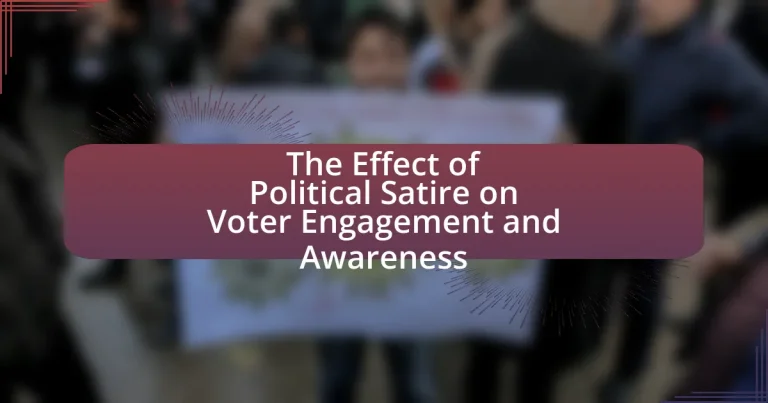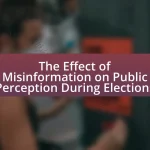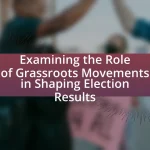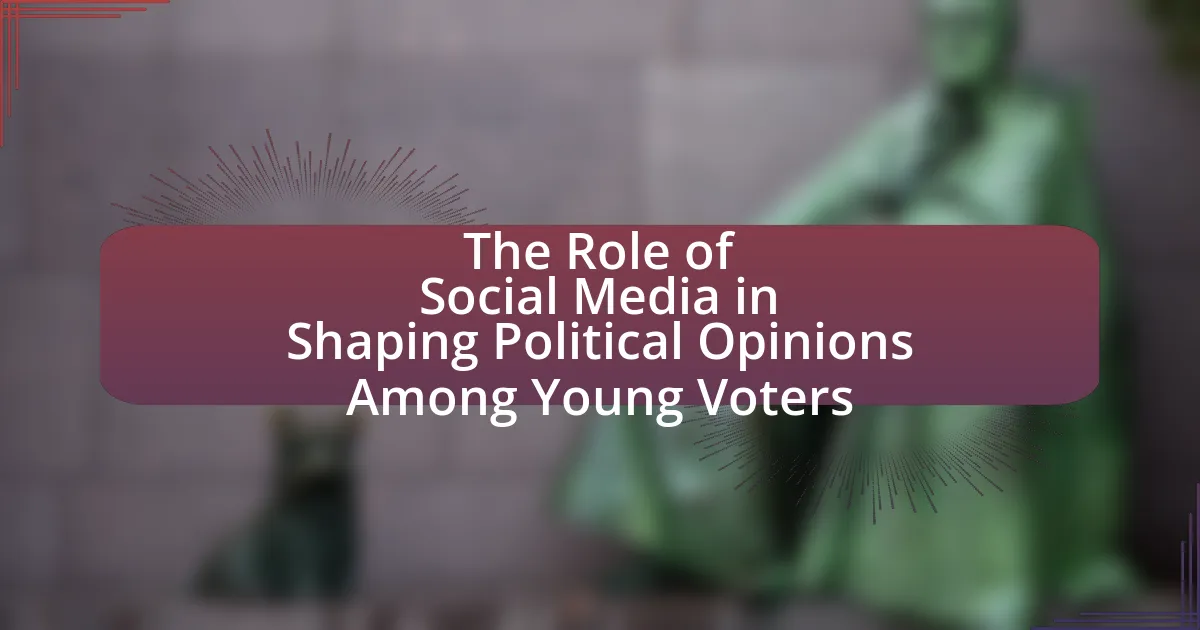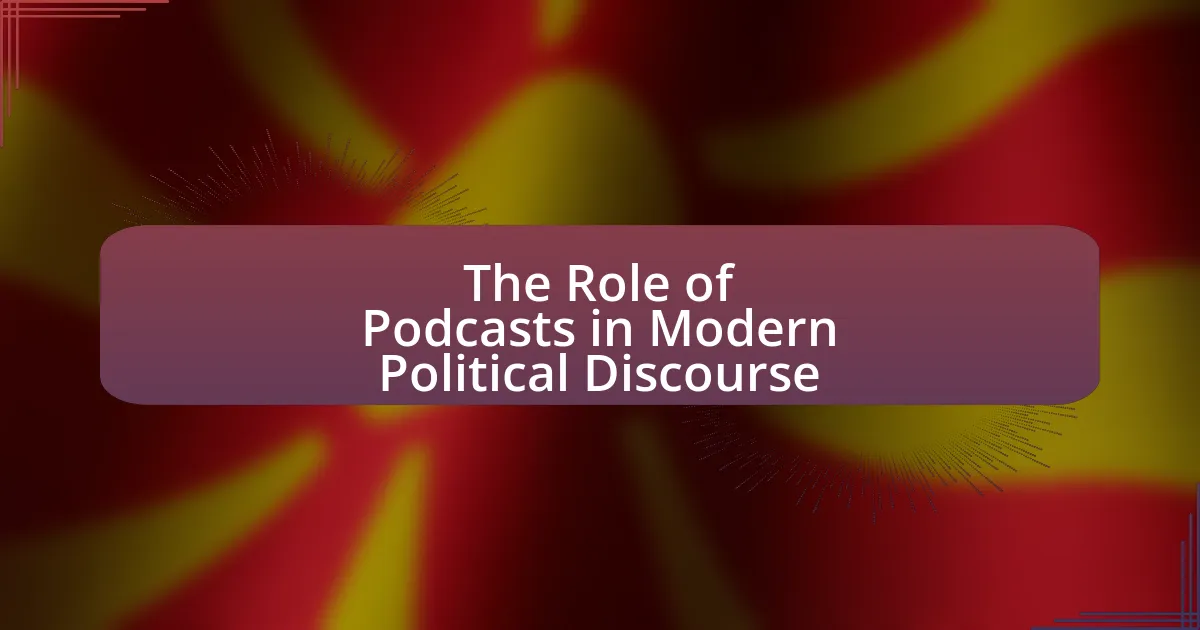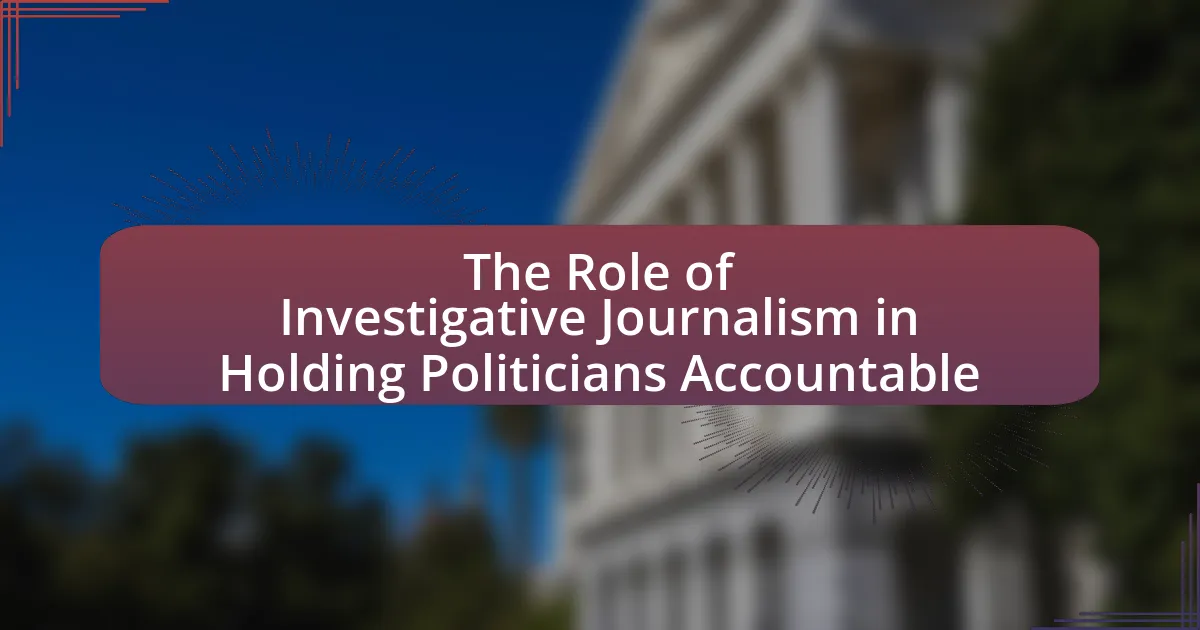Political satire plays a significant role in enhancing voter engagement and awareness by making complex political issues more accessible and entertaining. Research indicates that exposure to satirical content, such as programs like “The Daily Show” and “Saturday Night Live,” increases political knowledge and motivates civic participation. The article explores how political satire influences public perception, the role of humor in shaping opinions, and the differences in impact compared to traditional news media. It also examines the importance of voter engagement in a democratic society, factors contributing to low engagement rates, and the potential drawbacks of satire, including misinformation and polarization. Additionally, the article discusses strategies for effectively using political satire to enhance voter awareness and engagement across different demographics.
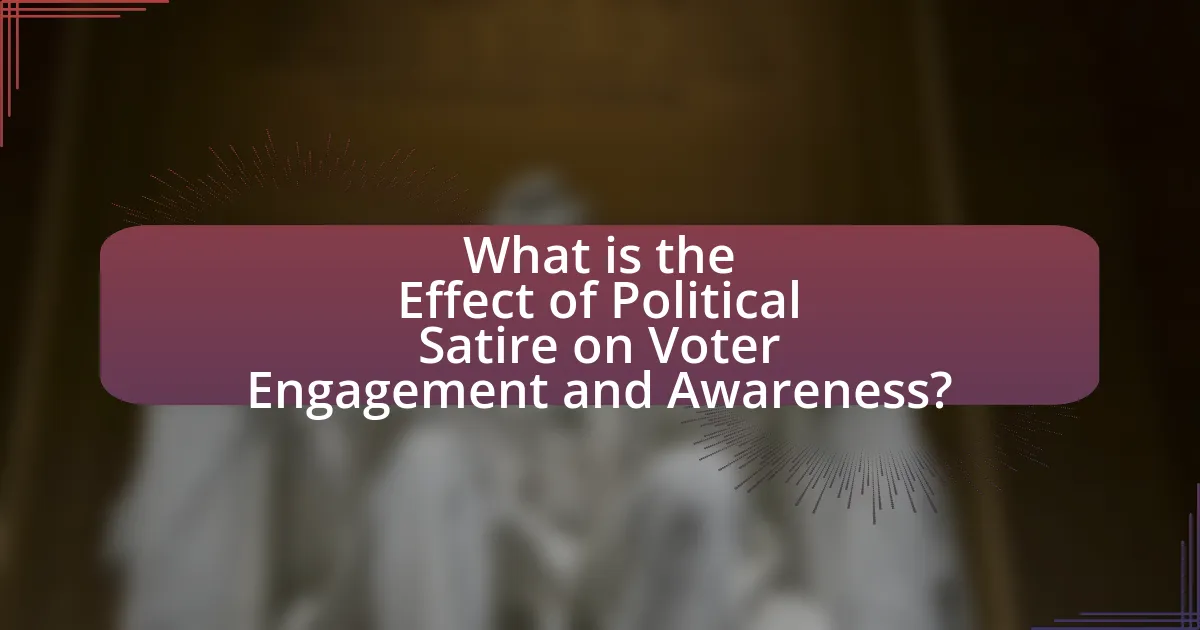
What is the Effect of Political Satire on Voter Engagement and Awareness?
Political satire significantly enhances voter engagement and awareness by making complex political issues more accessible and entertaining. Research indicates that exposure to political satire can increase political knowledge and motivate individuals to participate in the electoral process. For instance, a study published in the journal “Political Communication” found that viewers of satirical programs like “The Daily Show” and “Saturday Night Live” demonstrated higher levels of political awareness compared to non-viewers. This effect is attributed to the humorous framing of serious topics, which encourages audiences to discuss and reflect on political matters, ultimately leading to increased voter turnout and civic participation.
How does political satire influence public perception of political issues?
Political satire significantly influences public perception of political issues by shaping opinions and increasing awareness through humor and critique. This form of satire often simplifies complex political topics, making them more accessible and engaging for the audience. Research indicates that exposure to political satire can lead to greater political knowledge and engagement; for instance, a study by the Pew Research Center found that individuals who consume satirical content are more likely to discuss political issues and participate in civic activities. Additionally, political satire can challenge dominant narratives and encourage critical thinking, as seen in programs like “The Daily Show,” which often highlight inconsistencies in political rhetoric. Thus, political satire serves as a powerful tool in shaping public discourse and influencing perceptions of political matters.
What role does humor play in shaping political opinions?
Humor plays a significant role in shaping political opinions by making complex political issues more accessible and engaging for the public. Political satire, through its comedic lens, simplifies intricate topics, allowing individuals to grasp and reflect on political narratives more easily. Research indicates that exposure to political humor can increase political awareness and engagement; for instance, a study published in the journal “Political Communication” by researchers at the University of Pennsylvania found that viewers of satirical news programs were more informed about current events compared to those who consumed traditional news. This suggests that humor not only entertains but also serves as a catalyst for critical thinking and discussion regarding political matters.
How does political satire differ from traditional news media in its impact?
Political satire impacts audiences differently than traditional news media by engaging viewers through humor and entertainment, which can enhance retention and provoke critical thinking. While traditional news media often presents information in a straightforward manner, political satire uses exaggeration and irony to highlight political issues, making them more relatable and accessible. Research indicates that audiences exposed to political satire are more likely to discuss political topics and engage in civic activities, as evidenced by a study published in the journal “Political Communication,” which found that viewers of satirical programs like “The Daily Show” reported higher levels of political knowledge and engagement compared to those who primarily consumed traditional news.
Why is voter engagement important in a democratic society?
Voter engagement is crucial in a democratic society because it ensures that the electorate actively participates in the political process, influencing decision-making and governance. High levels of voter engagement lead to more representative outcomes, as seen in the 2020 U.S. presidential election, where a record 159 million Americans voted, reflecting a diverse range of opinions and interests. This participation fosters accountability among elected officials, as they are more likely to respond to the needs and concerns of an engaged electorate. Furthermore, studies show that increased voter turnout correlates with greater public trust in government and political institutions, reinforcing the legitimacy of democracy.
What factors contribute to low voter engagement rates?
Low voter engagement rates are primarily influenced by factors such as lack of awareness, disillusionment with the political process, and socioeconomic barriers. Research indicates that many potential voters are unaware of the electoral process or the importance of their participation, leading to apathy. Additionally, disillusionment arises from perceived corruption and inefficacy within political systems, which discourages individuals from voting. Socioeconomic barriers, including limited access to information and resources, further exacerbate the issue, as individuals from lower-income backgrounds may face challenges in accessing polling places or understanding voting procedures. These factors collectively contribute to the persistent issue of low voter engagement.
How can increased awareness lead to higher voter turnout?
Increased awareness can lead to higher voter turnout by informing citizens about the electoral process, candidates, and issues at stake, thereby motivating them to participate. Research indicates that when individuals are more informed, they are more likely to recognize the importance of their vote and feel empowered to engage in the democratic process. For instance, a study by the Pew Research Center found that 60% of voters cited information about candidates and issues as a key factor influencing their decision to vote. This correlation suggests that enhanced awareness, often facilitated by political satire and media coverage, can effectively mobilize voters by making them feel more connected to the political landscape and the implications of their choices.
What are the different forms of political satire?
Political satire manifests in various forms, including television shows, cartoons, literature, and social media content. Television shows like “Saturday Night Live” and “The Daily Show” use humor and parody to critique political figures and events, often influencing public opinion and voter engagement. Political cartoons, found in newspapers and online, utilize visual humor to comment on political issues, making complex topics more accessible. Satirical literature, such as George Orwell’s “Animal Farm,” employs allegory to critique political systems, while social media platforms enable rapid dissemination of satirical memes and videos, reaching a broad audience quickly. Each form serves to provoke thought and discussion, thereby enhancing voter awareness and engagement in the political process.
How do television shows contribute to political satire?
Television shows contribute to political satire by using humor and parody to critique political figures and policies, thereby shaping public perception and discourse. Programs like “Saturday Night Live” and “The Daily Show” employ satire to highlight political absurdities, making complex issues more accessible and engaging for viewers. Research indicates that exposure to political satire can increase political awareness and engagement among audiences, as evidenced by a study published in the journal “Political Communication,” which found that viewers of satirical content were more likely to discuss political issues and participate in civic activities. This demonstrates that television shows play a significant role in fostering political discourse through satire.
What impact do social media platforms have on the dissemination of political satire?
Social media platforms significantly enhance the dissemination of political satire by providing a rapid and widespread means of sharing content. These platforms enable users to create, share, and engage with satirical content instantly, reaching diverse audiences across geographical boundaries. For instance, a study by the Pew Research Center found that 55% of U.S. adults reported encountering political satire on social media, illustrating its prevalence and influence. Additionally, the viral nature of social media allows satirical content to be amplified through shares and likes, further increasing its visibility and impact on public discourse.
How does political satire affect different demographics of voters?
Political satire significantly influences different demographics of voters by shaping their perceptions and engagement levels. Research indicates that younger voters, particularly those aged 18-29, are more likely to consume political satire, which can enhance their political awareness and motivate them to participate in elections. For instance, a study by the Pew Research Center found that 61% of young adults reported that satirical content helped them understand political issues better. Conversely, older demographics may respond differently; they often prefer traditional news sources and may not engage as deeply with satire, leading to varied levels of political awareness and participation. Additionally, political affiliation plays a crucial role, as individuals who align with the satirist’s viewpoint are more likely to resonate with the content, reinforcing their existing beliefs and increasing their likelihood of voting. Thus, political satire serves as a tool that can either bridge or widen the engagement gap among different voter demographics.
What are the effects of political satire on younger voters?
Political satire significantly influences younger voters by increasing their political awareness and engagement. Research indicates that exposure to political satire can enhance understanding of political issues, as younger audiences often find humor more relatable and accessible than traditional news formats. A study published in the journal “Political Communication” by researchers at the University of Pennsylvania found that young viewers of satirical programs like “The Daily Show” and “Saturday Night Live” demonstrated higher levels of political knowledge and were more likely to participate in elections compared to their peers who consumed conventional news. This effect is attributed to the entertaining nature of satire, which can simplify complex political topics and stimulate discussions among younger audiences, ultimately fostering a more informed electorate.
How do different political affiliations respond to political satire?
Different political affiliations respond to political satire in distinct ways, often influenced by their ideological alignment. Research indicates that individuals with liberal affiliations tend to appreciate and engage more with political satire that critiques conservative figures or policies, as it aligns with their beliefs and reinforces their worldview. Conversely, conservatives may react defensively to satire targeting their ideology, often dismissing it as biased or unfunny, which can lead to a polarization effect where they disengage from the content. A study by the Pew Research Center found that 62% of liberal respondents reported enjoying political satire, while only 38% of conservatives felt the same way, highlighting the disparity in engagement levels based on political affiliation.
What are the potential drawbacks of political satire in political discourse?
Political satire can undermine serious political discourse by trivializing important issues and fostering cynicism among the electorate. This form of satire often reduces complex political matters to mere jokes, which can lead to a lack of understanding and engagement with substantive policy discussions. Research indicates that while satire can increase awareness, it may also contribute to political apathy, as individuals may feel that the political process is merely a source of entertainment rather than a serious civic duty. Furthermore, political satire can polarize audiences, reinforcing existing biases and creating echo chambers where individuals only engage with viewpoints that align with their own, thus diminishing constructive dialogue.
Can political satire lead to misinformation or misunderstanding?
Political satire can lead to misinformation or misunderstanding. This occurs because satire often exaggerates or distorts facts for comedic effect, which can mislead audiences who may not critically analyze the content. Research indicates that individuals exposed to satirical content may struggle to differentiate between factual information and humorous exaggeration, leading to misconceptions about political issues. A study by the Pew Research Center found that 62% of satirical news consumers believed that satire was a reliable source of information, highlighting the potential for misunderstanding.
How might political satire polarize public opinion?
Political satire can polarize public opinion by reinforcing existing biases and creating echo chambers among audiences. When satire targets specific political figures or ideologies, it often exaggerates flaws and promotes a particular narrative, which can lead individuals to align more strongly with their pre-existing beliefs. Research indicates that exposure to partisan satire can increase polarization; for instance, a study by the Pew Research Center found that individuals who consume satirical content aligned with their political views are more likely to develop negative perceptions of opposing viewpoints. This dynamic fosters division, as audiences may dismiss opposing perspectives as illegitimate or absurd, further entrenching their own political identities.
How can political satire be effectively used to enhance voter awareness?
Political satire can effectively enhance voter awareness by simplifying complex political issues and making them more relatable through humor. This approach engages audiences who may otherwise be disinterested in politics, as evidenced by studies showing that satirical content can increase political knowledge and stimulate discussions among viewers. For instance, a study published in the journal “Political Communication” found that exposure to political satire significantly improved participants’ understanding of political processes and issues, demonstrating its potential as a tool for voter education. By using humor to critique political figures and policies, satire not only entertains but also encourages critical thinking and informed voting behavior.
What strategies can be employed to maximize the positive effects of political satire?
To maximize the positive effects of political satire, creators should focus on targeting specific audiences, ensuring relatability, and promoting critical thinking. Targeting specific audiences allows satire to resonate more deeply, as seen in shows like “The Daily Show,” which effectively engages younger viewers by addressing issues relevant to them. Ensuring relatability enhances the impact of satire; for instance, using familiar cultural references can make complex political issues more accessible. Promoting critical thinking encourages audiences to question political narratives, as evidenced by studies showing that exposure to political satire can lead to increased political knowledge and engagement. By employing these strategies, political satire can effectively inform and engage voters, fostering a more informed electorate.
How can creators of political satire ensure accuracy while entertaining?
Creators of political satire can ensure accuracy while entertaining by conducting thorough research on the political subjects they address. This involves verifying facts, understanding the context of political events, and referencing credible sources to support their narratives. For instance, satirical shows like “The Daily Show” often fact-check their content against reputable news outlets, which enhances their credibility while maintaining humor. By blending factual accuracy with comedic elements, creators can engage audiences effectively without compromising the truth.
What best practices can be adopted for utilizing political satire to engage voters?
To effectively utilize political satire for engaging voters, creators should focus on relatability, clarity, and humor. Relatable content resonates with audiences, making complex political issues more accessible and engaging. Clarity ensures that the satire conveys a clear message, avoiding ambiguity that could confuse viewers. Humor, when used appropriately, can capture attention and encourage sharing, amplifying reach. Research indicates that satirical content can increase political awareness; for instance, a study by the Pew Research Center found that 61% of young adults reported learning about political issues through satire. By combining these elements, political satire can effectively engage and inform voters.
